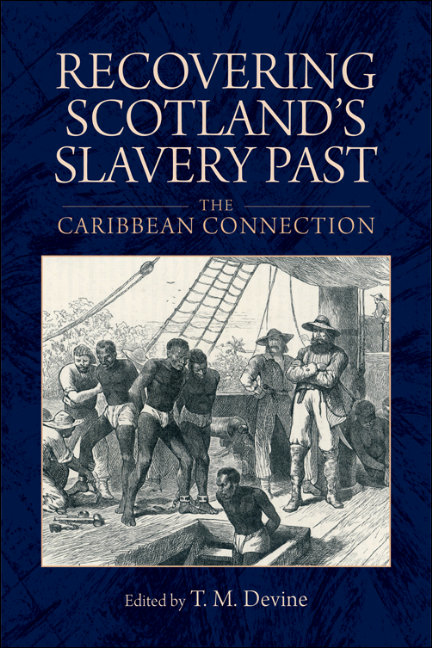Book contents
- Frontmatter
- Contents
- List of Illustrations and Tables
- List of the Contributors
- Acknowledgements
- Foreword
- map
- Introduction: Scotland and Transatlantic Slavery
- 1 Lost to History
- 2 Yonder Awa: Slavery and Distancing Strategies in Scottish Literature
- 3 Early Scottish Sugar Planters in the Leeward Islands, c. 1660–1740
- 4 The Scots Penetration of the Jamaican Plantation Business
- 5 ‘The habits of these creatures in clinging one to the other’: Enslaved Africans, Scots and the Plantations of Guyana
- 6 The Great Glasgow West India House of John Campbell, senior, & Co.
- 7 Scottish Surgeons in the Liverpool Slave Trade in the Late Eighteenth and Early Nineteenth Centuries
- 8 Scotland and Colonial Slave Ownership: The Evidence of the Slave Compensation Records
- 9 ‘The Upas Tree, beneath whose pestiferous shade all intellect languishes and all virtue dies’: Scottish Public Perceptions of the Slave Trade and Slavery, 1756–1833
- 10 ‘The most unbending Conservative in Britain’: Archibald Alison and Pro-slavery Discourse
- 11 Did Slavery make Scotia Great? A Question Revisited
- Conclusion: History, Scotland and Slavery 246
- Index
Introduction: Scotland and Transatlantic Slavery
Published online by Cambridge University Press: 15 December 2017
- Frontmatter
- Contents
- List of Illustrations and Tables
- List of the Contributors
- Acknowledgements
- Foreword
- map
- Introduction: Scotland and Transatlantic Slavery
- 1 Lost to History
- 2 Yonder Awa: Slavery and Distancing Strategies in Scottish Literature
- 3 Early Scottish Sugar Planters in the Leeward Islands, c. 1660–1740
- 4 The Scots Penetration of the Jamaican Plantation Business
- 5 ‘The habits of these creatures in clinging one to the other’: Enslaved Africans, Scots and the Plantations of Guyana
- 6 The Great Glasgow West India House of John Campbell, senior, & Co.
- 7 Scottish Surgeons in the Liverpool Slave Trade in the Late Eighteenth and Early Nineteenth Centuries
- 8 Scotland and Colonial Slave Ownership: The Evidence of the Slave Compensation Records
- 9 ‘The Upas Tree, beneath whose pestiferous shade all intellect languishes and all virtue dies’: Scottish Public Perceptions of the Slave Trade and Slavery, 1756–1833
- 10 ‘The most unbending Conservative in Britain’: Archibald Alison and Pro-slavery Discourse
- 11 Did Slavery make Scotia Great? A Question Revisited
- Conclusion: History, Scotland and Slavery 246
- Index
Summary
BETWEEN THE EARLY DECADES of the seventeenth century and the abolition of the British slave trade in 1807, ships of the Empire carried over 3.4 million Africans to a life of servitude, and often an early death, in the plantations across the northern Atlantic. That figure accounted for as many slaves delivered to that part of the New World over the period as the vessels of all other European nations combined. At the peak of the business in the 1760s, annual shipments reached an average of 42,000 slaves a year. As far as the history of black slavery in the northern Atlantic was concerned, Britain by all measures was the dominant force.
The system of bondage practised was chattel slavery, where the enslaved became the property of their masters until death, like their beasts of the field or their household plenishings, with no legal right to be treated as humans and with all the potential for exploitation and degradation which could accompany that helpless condition. The progeny of enslaved women also became the property of their masters at birth, either to be sold on from the plantation where they had been born or to spend their lives in hard labour within its bounds in perpetual servitude. Those modern sceptics who consider the contemporary poor at home, often eking out a miserable existence, or the indentured white servants in the transatlantic colonies, to be just as oppressed as black slaves, fail to take account of that stark and fundamental distinction. Colonial servants were bondsmen, indentured to labour, often under harsh conditions, but their contracts were not for life but for specific periods, usually an average of four to seven years, and were enforceable at law.
Throughout the Americas, the enormous increase in the output of the exotic commodities of sugar, tobacco, cotton, indigo and rum destined for consumption in Europe would have been impossible without the magnitude of black enslavement. The extreme risks to the health of whites in the tropics and the arduous climatic conditions of the transatlantic plantations made it impossible to attract European field workers by the late seventeenth century on anything like the numbers required by the intensity of the new capitalist agriculture.
- Type
- Chapter
- Information
- Recovering Scotland's Slavery PastThe Caribbean Connection, pp. 1 - 20Publisher: Edinburgh University PressPrint publication year: 2015

